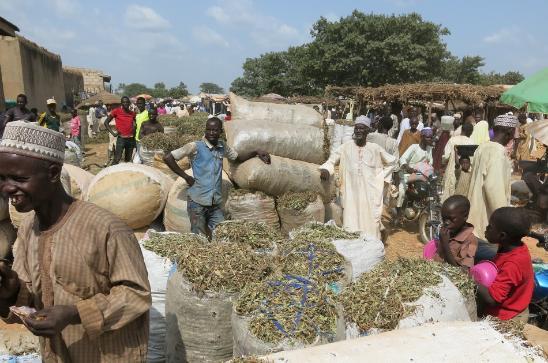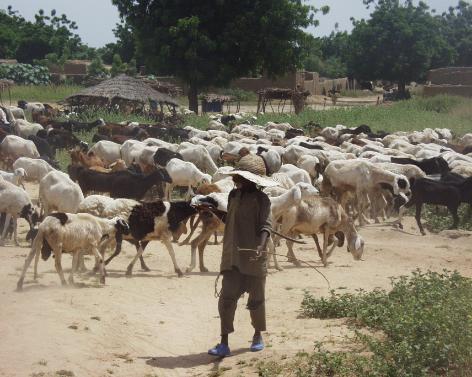Project in Burkina Faso and Niger
Enabling Value Chains to Create Sustainable Income for Vulnerable People in Crop-Livestock Systems of Burkina Faso and Niger
Timeframe: January 2018 - February 2021
Funding: USAID
Principal investigator (PI) and lead institution
Vincent Bado, International Crops Research Institute for Semi-Arid Tropics (ICRISAT)
Co-PI and collaborator institutions
- Augustine Ayantunde, International Livestock Research Institute (ILRI)
- Abdoulaye Gouro, Conseil National de Recherche Agronomique CNRA-Niger
- Hadja Oumou Sanon, Institute de l’Environnement et de Recherche Agricole INERA-Burkina Faso
Video: Impacts of the project
Link to video: https://youtu.be/s8kucQqRH6w
Journal Articles
Ayantunde A.A., Adamou K., Seybou G., and Moumouni O. 2022. Livestock feed markets across seasons in periurban areas of Niger: seller and buyer profiles, feed price and quality. Rev. Elev. Med. Vet. Pays Trop., 75 (2). https://doi.org/10.19182/remvt.36921 (French with PDF in English)
Kabore, M., Sanon H. O., Kiema A., et Nianogo A. J. 2020. Étude du maillon de la transformation des petits ruminants dans la commune de Ouagadougou au Burkina Faso. Spécial hors-série n° 5 — Janvier 2020, Science et technique, Sciences naturelles et appliquées. French language. (Study of the processing links of small ruminants in the communal district of Ouagadougou in Burkina Faso. Special issue No. 5, January 2020, Science and Technique, Natural and Applied Sciences, p. 471-483.)
Kabore, M., Sanon, H.O., Kiema, A., Nianogo, A.J. and Gnanda, I.B. 2022. Evaluation des performances de l’embouche ovine paysanne dans la commune de Korsimoro au Burkina Faso (Evaluation of the performance of peasant sheep fattening in the commune of Korsimoro in Burkina Faso). Int. J. Biol. Chem. Sci. 16(3): 1031-1043. https://dx.doi.org/10.4314/ijbcs.v16i3.11
Umutoni, C., Bado, V., Whitbread, A., and Ayantunde, A. 2021. Assessment of Stovers of Dual-Purpose Pearl Millet Varieties as Feed for Goats in the West African Sahel. International Journal of Livestock Research, 11(12), 37-43. https://dx.doi.org/10.5455/ijlr.20210712082123
Umutoni, C., Bado, V., Whitbread, A., Ayantunde, A., and Gangashetty, P. 2021. Evaluation of chemical composition and in vitro digestibility of stovers of different pearl millet varieties and their effect on the performance of sheep in the West African Sahel. Acta Agriculturae Scandinavica, Section A — Animal Science. https://doi.org/10.1080/09064702.2021.1919193
Other Results
-
Bado, V., van Rooyen, A., Umutoni, C., and Whitbread. A. 2021. Involving Stakeholders in Crop-Livestock Systems Analysis: Innovation Platforms in Burkina Faso and Niger, West Africa. International Grasslands Congress. University of Kentucky.
-
Working paper. Kumar Shalander Pramanik, S., Umutoni, C., Rich, K., Bado, V., and Whitbread, A. 2021. Crop-livestock integration and technology choices for improving fodder availability, livestock productivity and famers’ income in West Africa. ICRISAT Working Paper No. 63, Patancheru 502 324, India: International Crops Research Institute for the Semi-Arid Tropics (ICRISAT). 18 pp.
-
Presentation Summary. March 22, 2021. Co-designing profitable and resilient crop-livestock systems in Niger and Burkina Faso using a household modelling approach. 7th International Symposium for Farming Systems Design.
- Innovation Summary. June 2020. Innovation Platforms to Enhance the Small Ruminant Value Chain
- Story on Agrilinks: Applied Business Model for Animal Feed Generates Revenue and Improves Livelihoods of Smallholder Farmers in Niger
- ICRISAT Newsletter:
- November 2020. Gross Margin Analysis – A tool for better farm management
- October 2020. Fodder chopping machines lead to a thriving livestock feed enterprise in rural Niger
- December 2019. New dual-purpose pearl millet shows promise as excellent fodder in Niger
- September 2019. Solving the livestock feed supply-demand puzzle in Niger
- March 2019. Livestock value chain strengthening essential for improving production and food security in Niger, say scientists
- November 2018. Boosting confidence in farm innovations – simulating impact with systems modelling tools
- May 2018: Project launch: Joining the dots between crops, livestock and markets in West Africa
- Poster: Evaluation of the feed quality of six dual purpose pearl millet varieties and growth performance of sheep fed their residues in Niger
Project Plan
 Rainfed agriculture and livestock support the vast majority of people living in rural Burkina Faso and Niger. Yet research to support these vulnerable populations has been lacking. This project took a comprehensive approach to investigate how connected crop and livestock systems affect the development of more productive and equitable markets.
Rainfed agriculture and livestock support the vast majority of people living in rural Burkina Faso and Niger. Yet research to support these vulnerable populations has been lacking. This project took a comprehensive approach to investigate how connected crop and livestock systems affect the development of more productive and equitable markets.
The project sought to contribute to food security and poverty alleviation by improving the value chains of crop-livestock systems related to small ruminants. It applies the Innovation Platform approach to unite stakeholders in the pursuit of transformational learning and best practices. Youth and women in particular are targeted for training and interventions for income-generating enterprises.
Taking a regional approach across two Sahelian countries, the three-year project will employ a co-principal investigator in each country, and it will collaborate with the on-going USAID-funded initiative on Resilience and Economic Growth in the Sahel–Enhanced Resilience (REGIS-ER) in Burkina and Niger.
 Objectives
Objectives
The goal of the project was to increase production of animal-source food through the integrated management of crop-livestock systems with participation of small ruminant livestock keepers. Specific objectives were:
- Development of inclusive crop-livestock value chains and conducive policy environments
- Development of improved feed and feeding systems to improve animal health and animal-source food
- Participative development of improved scenarios of crop-livestock farming systems, which enhance resilience, productivity, and sustainability, and increase participation of youth and women in income-generating enterprises.
More Information
 October 2020 research update BADO VGM (Virtual General Meeting)
October 2020 research update BADO VGM (Virtual General Meeting)
Photo credit: V. Bado/ICRISAT
Feed the Future Innovation Lab for Livestock Systems is part of Feed the Future





